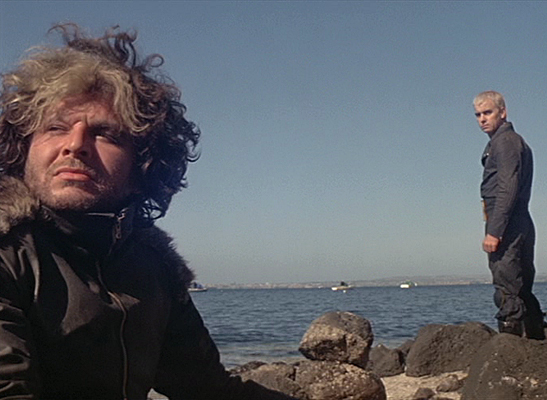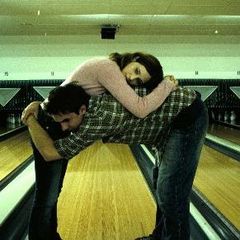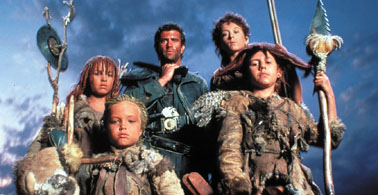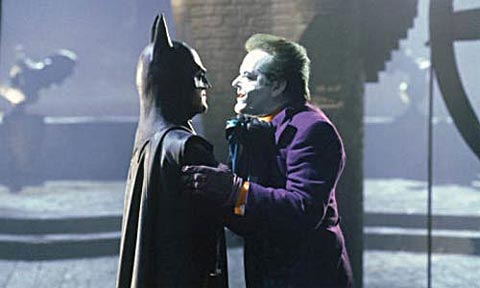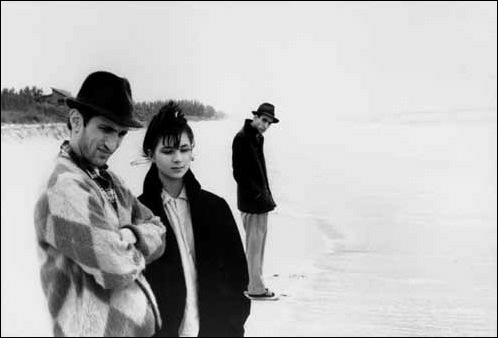
About a half hour into Watchmen, as the rude and crude Comedian was being laid to rest with Simon and Garfunkel's "The Sounds of Silence" playing sweetly in the background I thought to myself, "Oh, no. This is self-important pretentious posturing." Then, fairly, I thought back to the source graphic novel - the comic geek's War and Peace if you will. "Was that self-important pretentious posturing as well?"
The truth is, these concerns quickly subsided as I again surrendered myself to the story and, in this oddest of cases for this comic geek. the incredibly reverent storytelling. Watchmen, the graphic novel and the film, are self-important pieces of fiction stemming from the arrogance of the brillant weirdo Alan Moore. But, as anyone who really works through the deconstruction of the superhero myth that Alan Moore laid out 20+ years ago, it is objectively important. A social commentary, epically told superhero story with heroes afflicted with the human condition in all its debilitating glory.
Rorshach, easily my favorite character in both mediums, is a psychopathic sleuth with a brutal, uncompromising sense of justice. He's a jarring character, an socially inept weirdo in a costume who is also a mentally and emotionally scarred deviant working outside the law. On the page, his words are put in scratchy, sketchy balloons and we as readers are left to imagine what sort of unusual voice would deliver such oddly drawn speech patterns. And perhaps that's where the gift of the film begins. Jackie Earle Haley, that newly rediscovered talent from the 70s, was nominated for a Best Supporting Actor Oscar in 2006 for his work in Little Children. I thought the whole performance was overrated. After seeing his work as Rorshach, I reconsider. You see, his characters, although both scarred social outcasts, are on opposite ends of the performance spectrum. His brutality, his growl, his stiff anger as Rorshach is the foil for his Little Children's character's weakness, sadness, and quiet anger. And that growl(!), I am more than pleased to say, is exactly how I imagined Rorshach would sound even if it never occurred to me until I heard Haley's first words in the trailer.
But each of these performers in the movie playing these characters firmly placed in my memory is for better or for worse the perfect person to play their part (save maybe Carla Gugino as Sally Jupiter, playing it campy). I say for better or for worse because naturally some of these characters work better on the page than on the screen. Laurie Jupiter (aka Silk Spekter II), is one of those characters. And I won't fault Malin Akerman for any of it, though many reviews I have read turn quickly on her. She fits the part to a tee and executes it wholley reverently. But something about Laurie fits within comic panels better than the confines of the silver screen. As the naive and sweetly sexy ingenue heroine acting as knowing commentary on the comic book medium, Laurie Jupiter works. But that role in a film, that medium where we haven't seen that obligatory gal in spandex to the same effect, the character seems an odd fit. And to see her and her mother as the transition from the Golden Age to whatever the geeks are calling this age makes eerie sense in the comics and very little on film where the Golden Age has all but been ignored completely.
Kudos to Patrick Wilson, Haley, Billy Crudup, Jeffrey Dean Morgan, and Matthew Goode for their insight into bringing the pages and characters to life. Each is an uncanny fit for their character counterparts and whomever cast this film has to be pat on the back. Haley and Crudup are the standouts receiving all scant critical praise, and deservedly so. Crudup, in particular, delivers a performance of tremendous subtlety and restraint (albeit through a CGI avatar). His character is more than a comment on superheroes. Dr. Manhattan is a comment on religion and on God seen through a glass darkly. The insights, while not my own on this subject, are fascinating and bracing. It's a difficult character to bring to life, but Crudup and Snyder's team of special effects wizards more than conquer the challenge. Crudup's Dr. Manhattan, perhaps even more so than in his graphic novel incarnation, is an indelible film creation.
Zach Snyder and his screenwriters David Hayter and Alex Tse are aware of how to tell the story in this medium. The unnecessary parts of the graphic novel (or, for the fanboys who just gasped at the hint of anything in Watchmen being unnecessary,
"medium-specific") are left out and the good stuff is left in. The big change to the ending pleased me the most. The crux of the graphic novel is perfect for that medium - a ugly monster spelling possible doom for the world and our heroes. But that doesn't work on the big screen where even the most outlandish of villains (I'm looking at you, Willem Dafoe as Green Goblin, and you, Colin Farrell as Bullseye) are more real than what is depicted in the last fourth of the graphic novel. So, bravo for the change. There's the fact that it is minor yet still makes the whole calamity at end actually work. The Black Freighter allergorical interludes and newstand gang on that iconic corner are largely absent from the big screen version. Good. These were my least favorite parts of the graphic novel and have no place in the big screen story. After all, we're watching the story of the Watchmen and there's enough of that story to adequately fill its runtime and more.
I like Zach Snyder. With Dawn of the Dead and now Watchmen, he has proven to be a visually savvy storyteller with a leaning towards the sensational. But anyone who has seen 300, fans and non-fans alike, can tell you he knows nothing of subtlety. His fetishizing of slo-motion and violence in 300 isn't at full-throttle in Watchmen, but he certainly isn't afraid to push the limits. The violence is brutal and graphic, but he eases up on his slo-mo habit enough to keep Watchmen watchable.
I was worried after I finished reading Watchmen for the first time last Spring. "How can they make this movie? No one will want to see it?" I say this knowing that, like me, there were leagues of fanboys frothing at the mouth at the mere prospect of a big screen adaptation. The "no one" in question is the general public, the ones who go to see the Spider-man, Batman, or (Heaven forbid) the Fantastic Four movies but more than likely would not care to see their heroes deconstructed. There was talk of this public being ready for a movie like Watchmen after the success of The Dark Knight, but I knew and you will know that this is a hasty comparison. Bruce Wayne as Batman is haunted and conflicted, but he is not the deranged Rorshach. If you could love the Joker (and some of us really did), then maybe you'd like Rorshach, but not as hero. In the end of the Dark Knight, after all the darkness and despair, Batman rides off as the "
hero" in every sense of the word. In Watchmen, "hero" takes on its own meaning and the term "anti-hero" doesn't fully capture the complexity of its characters. Watchmen is not The Dark Knight, and I expect to see a sharp drop off in box office after all the marketing hoopla and hype dies down and that general public tells their general public pals it wasn't what they wanted.
This calls into question the audience. Who is this movie for? Zach Snyder has said that the movie is for fans first. I believe him. An editor for Rottentomatoes.com, after being told by another reviewer that non-fans won't be able to follow the epic story and mythology, said something along the lines that they, like she, won't care to. That's probably the case. So, what do we have? We have Warner Brothers thinking a $150 million dollar (reportedly) production budget (along with anywhere from 20-35+ million dollars for marketing) for a film taken from a cult comic book with critical acclaim will appeal to its targeting ticket paying audience. And they're wrong. The movie is good for me. I love the movie. And Warner Brothers will likely make enough money through box office receipts and DVD sales and countless special editions to make a profit. But in today's Hollywood, making $100 million dollars domestically isn't enough. Time will tell if Watchmen is viewed as a success for Warner Brothers. My question is what happens when they want to make something faithfully for us fanboys next time? I don't think it'll happen so easily (a joke if you consider Watchmen's 20 year production hell).
Let's just say for now, for me, I love it. I got chills several times. The kind where you see something imagined realized for the first time. And that's a special feeling Watchmen offers me and my geek brethren that we might have to wait another 20to feel again. Watchmen has always been something you finish with your emotions deflated and exhausted and your head spinning around the implications of it ending. Hopefully, not every one will leave the theater talking about what's in the movie and what isn't or what they wish it would have been like, but rather discussing that ending. After all the hoopla and hype are gone, that ending resonates over even the harshest of critics.
****
Joe Morgenstern Wall Street Journal Watchmen Review 3/6/09Roger Ebert Watchmen Review 3/4/09Box Office Mojo Weekend Report 3/8/09
